Alumni of our lab have gone on to successful careers, both within Stony Brook and at notable institutions world-wide. For example, after training with Dr. Rigas, Drs. Jennie L. Williams and Gerardo Mackenzie went on to run their own, NIH-funded laboratory groups within the Division of Cancer Prevention. Dr. Mackenzie was subsequently recruited to UC Davis. Drs K-W Cheng and CC Wong became faculty at the prestigious Peking University and Chinese University of Hong Hong, respectively.
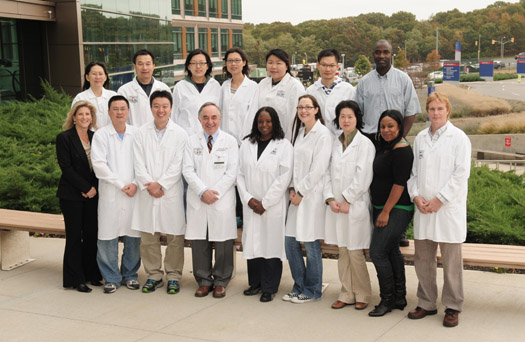
Back Row Left to Right: Liqun Huang, Nengtai Ouyang, Yu Sun, Dingying Zhou, Ting Nie, Kawing Cheng, Ninche Alston;
Front Row Left to Right: Dawn Huether, Gang Xie, Caihua Zhu, Dr. Rigas, Jennie Williams, Leahana Rowehl, Ping Ji, Onika Murray, Gerardo Mackenzie
Recent Alumni
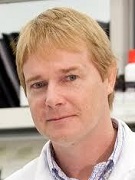
Gerardo Mackenzie, PhD
Dr. Mackenzie received his Ph.D. from the University of Buenos Aires and did postdoctoral work at the University of California, Davis prior to joining the Division of Cancer Prevention at Stony Brook. While here, his research was centered on the evaluation of mechanism-based pharmacological agents for the management of colon and pancreatic cancer. Dr. Mackenzie was recently recruited back to a faculty position at UC Davis.
SELECTED PUBLICATIONS
- Mattheolabakis G, Papayannis I, Yang J, Vaeth BM, Wang R, Bandovic J, Ouyang N, Rigas B, Mackenzie GG. Phospho-Aspirin (MDC-22) Prevents Pancreatic Carcinogenesis in Mice. Cancer Prev Res (Phila). 2016 Jul;9(7):624-34.
- Bartels LE, Mattheolabakis G, Vaeth BM, LaComb JF, Wang R, Zhi J, Komninou D, Rigas B, Mackenzie GG. The novel agent phospho-glycerol-ibuprofen-amide (MDC-330) inhibits glioblastoma growth in mice: an effect mediated by cyclin D1. Carcinogenesis. 2016 Apr;37(4):420-9.
- Choy YY, Fraga M, Mackenzie GG, Waterhouse AL, Cremonini E, Oteiza PI. The PI3K/Akt pathway is involved in procyanidin-mediated suppression of human colorectal cancer cell growth. Mol Carcinog. 2016 Jan 15.
- Son JS, Khair S, Pettet DW 3rd, Ouyang N, Tian X, Zhang Y, Zhu W, Mackenzie GG, Robertson CE, Ir D, Frank DN, Rigas B, Li E. Altered Interactions between the Gut Microbiome and Colonic Mucosa Precede Polyposis in APCMin/+ Mice. PLoS One. 2015 Jun 29;10(6).
- Huang L, Wong CC, Mackenzie GG, Sun Y, Cheng KW, Vrankova K, Alston N, Ouyang N, Rigas B. Phospho-aspirin (MDC-22) inhibits breast cancer in preclinical animal models: an effect mediated by EGFR inhibition, p53 acetylation and oxidative stress. BMC Cancer. 2014 Feb 28;14:141.
- Mackenzie GG, Bartels LE, Xie G, Papayannis I, Alston N, Vrankova K, Ouyang N, Rigas B. A novel Ras inhibitor (MDC-1016) reduces human pancreatic tumor growth in mice. Neoplasia. 2013 Oct;15(10):1184-95.
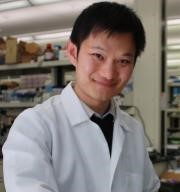
Ka Wing Cheng, Ph.D.
Dr. Ka-Wing Cheng, former lead Research Scientist, is a graduate of the University of Hong Kong and has published over 50 papers. The recipient of multiple honors and awards, Dr. Cheng was recently awarded a research grant to study drug combinations for the treatment of non-melanoma skin cancer.
Dr. Cheng’s research focused mainly on the pre-clinical evaluation of phospho-nonsteroidal anti-inflammatory drugs for cancer prevention, including development of novel anticancer drugs and investigation of their molecular mechanisms of action.
Dr. Cheng is currently Distinguished Assistant Professor at Peking University and the recipient of the prestigious 1000 Young Investigators Award.
SELECTED PUBLICATIONS
Xie G, Zhou D, Cheng KW, Rigas B. Comparative in vitro metabolism of phospho-tyrosol-indomethacin by mice, rats and humans. Biochemical Pharmacology, 2013, 85, 1195-1202.
- Cheng KW, Matthaiolampakis G, Wong CC, Ouyang N, Huang L, Constantinides PP, Rigas B. Topical phospho-sulindac (OXT-328) is effective in the treatment of non-melanoma skin cancer. Int J Oncol. 2013;30:1471-1482.
- Wong CC, Cheng KW, Xie G, Zhou D, Zhu CH, Constantinides PP, Rigas B. Carboxylesterases 1 and 2 hydrolyze phospho-nonsteroidal anti-inflammatory drugs: relevance to their pharmacological activity. J Pharmacol Exp Ther,, 2012;340:422-432.
- Wong CC, Cheng KW, Rigas B. Preclinical predictors of anticancer drug efficacy: Critical assessment with emphasis on whether nanomolar potency should be required of candidate agents. J Pharmacol Exp Ther. 2012;340:422-432.
- 4. Zhu C, Cheng KW, Ouyang N, Huang L, Sun Y, Constantinides PP, Rigas B. Phosphosulindac (OXT-328) selectively targets breast cancer stem cells in vitro and in human breast cancer xenografts. Stem cells, 2012:30:2065-2075.
For a complete list of publications, click here
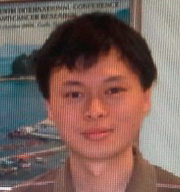
Chi Chun Wong, Ph.D.
Assistant Professor, Chinese University of Hong Kong
Dr. Wong received his PhD in Nutritional Biochemistry from the University of Leeds, where he studied the metabolism and transport of flavonoids in humans. His earlier education included a BSc in Food and Nutritional Science and a MPhil in Biological Sciences, both from The University of Hong Kong. At Stony Brook he studied the metabolism, transport and other aspects of the preclinical development of modified NSAIDs.
Dr. Wong is an Assistant Professor in the Department of Medicine and Therapeutics at the Chinese University of Hong Kong.
SELECTED PUBLICATIONS
Wong CC, Cheng KW, Xie G, Zhou D, Zhu C-H, Constantinides PP, Rigas B. Carboxylesterases 1 and 2 hydrolyze phospho-NSAIDs: Relevance to their pharmacological activity. J Pharmacol Exp Ther, 2012;340422-32.
- Nie T, Wong CC, Alston N, Aro P, Constantinides P P, B Rigas B. Phospho-ibuprofen (MDC-917) incorporated in nanocarriers: Anti-cancer activity in vitro and in vivo. Br J. Pharmacol, 2012:166:991-1001
- Wong CC, Cheng KW, Rigas B. Preclinical predictors of anticancer drug efficacy: Critical assessment with emphasis on whether nanomolar potency should be required of candidate agents. J Pharmacol Exp Ther, 2012;341:572-8
- Cheng KW, Matthaiolampakis G, Wong CC, Ouyang N, Huang L, Constantinides PP, Rigas B. Topical phospho-sulindac (OXT-328) is effective in the treatment of non-melanoma skin cancer. Int J Oncol, 2012;41:1199-203.
- Xie G, Wong CC, Cheng KW, Huang L, Constantinides PP, Rigas B. Regioselective oxidation of NSAIDs and phospho-NSAIDs by human cytochrome P450 and flavin monooxygenase isoforms: Implications for their pharmacokinetic properties and safety. Br J Pharmacol, 2012:167:222-32.
- Wong CC, Cheng KW, Papayannis I, Mattheolabakis G, Huang L, Xie G, Ouyang N, Rigas B. Phospho-NSAIDs have enhanced efficacy in mice lacking plasma carboxylesterase: Implications for their clinical pharmacology. Pharm Res, 2015;32:1663-75
For a complete list of publications, click here
 Yu Sun, Ph.D.
Yu Sun, Ph.D.
Research Assistant Professor
yu.sun@pharmacy.rutgers.edu
Dr. Sun received her Ph.D. from the National University of Singapore and the Karolinska Institute in Sweden. For her thesis, Dr. Sun worked on the chemotherapeutic resistance in B lymphoma cells. In our lab, Dr. Sun worked on the role of reactive oxygen and nitrogen species in cancer control with emphasis on the thioredoxin system.
Dr. Sun is currently an Assistant Professor at Rutgers University.
SELECTED PUBLICATIONS
- Sun Y, Rowehl LM, Huang L, Mackenzie GG, Vrankova K, Komninou D, Rigas B. Phospho-ibuprofen (MDC-917) suppresses breast cancer growth: an effect controlled by the thioredoxin system. Breast Cancer Res. 2012 Jan 31;14(1):R20. PubMed PMID: 22293394; PubMed Central PMCID: PMC3496138.
- Sun Y, Huang L, Mackenzie GG, Rigas B. Oxidative stress mediates through apoptosis the anticancer effect of phospho-nonsteroidal anti-inflammatory drugs: implications for the role of oxidative stress in the action of anticancer agents. J Pharmacol Exp Ther. 2011 Sep;338(3):775-83. doi: 10.1124/jpet.111.183533. Epub 2011 Jun 6. PubMed PMID: 21646387; PubMed Central PMCID: PMC3164348.
- Sun Y, Chen J, Rigas B. Chemopreventive agents induce oxidative stress in cancer cells leading to COX-2 overexpression and COX-2-independent cell death. Carcinogenesis. 2009 Jan;30(1):93-100. doi: 10.1093/carcin/bgn242. Epub 2008 Oct 24. PubMed PMID: 18952595; PubMed Central PMCID: PMC2639032.
- Sun Y, Rigas B. The thioredoxin system mediates redox-induced cell death in human colon cancer cells: implications for the mechanism of action of anticancer agents. Cancer Res. 2008 Oct 15;68(20):8269-77. doi: 10.1158/0008-5472.CAN-08-2010. PubMed PMID: 18922898; PubMed Central PMCID: PMC3565581.
- Rigas B, Sun Y. Induction of oxidative stress as a mechanism of action of chemopreventive agents against cancer. Br J Cancer. 2008 Apr 8;98(7):1157-60. doi: 10.1038/sj.bjc.6604225. Epub 2008 Feb 5. Review. PubMed PMID: 18253125; PubMed Central PMCID: PMC2359637.
For a complete list of publications, click here
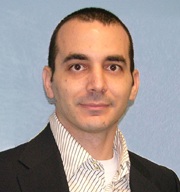 George Matthaiolampakis, Ph.D.
George Matthaiolampakis, Ph.D.
Postdoctoral Associate, Northeastern University
Dr. Matthaiolampakis received his BS in Chemical Engineering from the National Technical University of Athens and his PhD in Pharmaceutical Technology from the University of Patras. In our lab he worked on nanoformulation and preclinical drug development.
He is currently at Northeastern University, Boston, MA.
SELECTED PUBLICATIONS
Mattheolabakis G, Nie T, Constantinides PP, Rigas B. Sterically stabilized liposomes incorporating the novel anticancer agent phospho-ibuprofen (MDC-917): Preparation, characterization and in vitro/in vivo evaluation. Pharmaceutical Research, 2012; 29:1435-43
- Mattheolabakis G, Mackenzie GG, Huang L, Ouyang N, Cheng KW, Rigas B. Topically applied phospho-sulindac hydrogel is efficacious and safe in the treatment of experimental arthritis in rats. Pharmaceutical Research, 2013; 30:1471-82
- Mackenzie GG, Huang L, Alston N, Ouyang N, Vrankova K, Mattheolabakis G, Constantinides PP, Rigas B. Targeting mitochondrial STAT3 with the novel phospho-valproic acid (MDC-1112) inhibits pancreatic cancer growth in mice. PLoS ONE, 2013; 8(5):e61532
- Mattheolabakis G, Wong CC, Sun Y, Amella CA, Richards R, Constantinides PP, Rigas B. Pegylation improves the pharmacokinetics and bioavailability of small-molecule drugs hydrolyzable by esterases: a study of phospho-Ibuprofen. J Pharmacol Exp Ther. 2014; 351:61-6
For a complete list of publications, click here